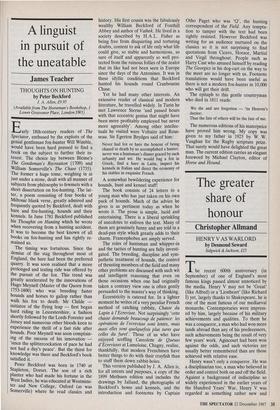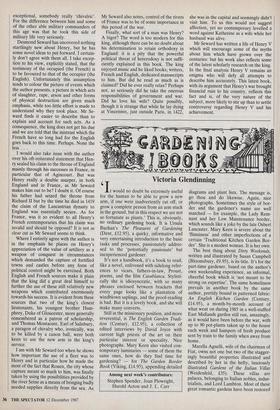The greater share of honour
Christopher Alhnand
HENRY V AS WARLORD by Desmond Seward
Sidgwick & Jackson, £15
The recent 600th anniversary (in September) of one of England's most famous kings passed almost unnoticed by the media. Henry V may not be 'Great' (like Alfred) or a `Lionheart' (like Richard I) yet, largely thanks to Shakespeare, he is one of the most famous of our mediaeval monarchs. Contemporaries were impress- ed by him, largely because of his military achievements and qualities. To them he was a conqueror, a man who had won more lands abroad than any of his predecessors, such achievements being the result of very few years' work. Agincourt had been won against the odds, and such victories are usually better remembered than are those achieved with relative ease.
Henry wasn't only a conqueror. He was a disciplinarian too, a man who believed in order and control both on and off the field. Against a background of indiscipline so widely experienced in the earlier years of the Hundred Years' War, Henry V was regarded as something rather new and exceptional, somebody really 'chivalric'. For the difference between him and some of the other able military commanders of this age was that he took this side of military life very seriously.
Desmond Seward has uncovered nothing startlingly new about Henry, but he has some novel ideas to put forward. I certain- ly don't agree with them all. I take excep- tion to his view, explicitly stated, that the testimony of the occupied (the French) is to be favoured to that of the occupier (the English). Unfortunately this assumption tends to colour the picture of events which the author presents, a picture in which acts of slaughter, rape, arson and other forms of physical destruction are given much emphasis, while too little effort is made to understand why they took place. Mr Se- ward finds it easier to describe than to explain and account for such acts. As a consequence, the king does not get his due and we are told that the mistrust which the French have so long had for the English goes back to this time. Perhaps. None the less . . .
I would also take issue with the author over his oft-reiterated statement that Hen- ry sealed his claim to the throne of England mainly through his successes in France, in particular that of Agincourt. But was Henry really a double usurper, in both England and in France, as Mr Seward makes him out to be? I doubt it. Of course his father had seized the throne from Richard II but by the time he died in 1419 the claim of the Lancastrian dynasty to England was essentially secure. As for France, was it so evident to all Henry's French contemporaries that his claim was invalid and should be opposed? It is not as clear cut as Mr Seward seems to think.
Where I entirely agree with the author is in the emphasis he places on Henry's appreciation of the value of artillery as a weapon of conquest in circumstances which demanded the capture of fortified towns and castles before any form of political control might be exercised. Both English and French sources make it plain that the king did a great deal himself to further the use of these still relatively new weapons which contributed enormously towards his success. It is evident from these sources that two of the king's closest lieutenants, his youngest brother Hum- phrey, Duke of Gloucester, more generally remembered as a patron of scholarship, and Thomas Montacute, Earl of Salisbury, a paragon of chivalry who, ironically, was to be killed by a canon ball, were both keen to use the new arm in the king's service.
I am with Mr Seward too when he shows how important the use of a fleet was to Henry and in particular how he made the most of the fact that Rouen, the city whose capture meant so much to him, was finally taken by using the possibilities provided by the river Seine as a means of bringing badly needed supplies directly from the sea. As Mr Seward also notes, control of the rivers of France was to be of some importance in this period of the war.
Finally, what sort of a man was Henry? A bigot? The word is too modern for this king, although there can be no doubt about his determination to retain orthodoxy in England: it is a pity that the powerful political threat of heterodoxy is not suffi- ciently explained in this book. The king enjoyed music and he liked books; writers, French and English, dedicated manuscripts to him. But did he read as much as is claimed? Did he ever really relax? Perhaps not, so seriously did he take the onerous responsibilities of government and war. Did he love his wife? Quite possibly, though it is strange that while he lay dying at Vincennes, just outside Paris, in 1422, she was in the capital and seemingly didn't visit him. To us this would not suggest affection, yet no contemporary levelled a word against Katherine as a wife while her husband was alive.
Mr Seward has written a life of Henry V which will encourage some of the myths about him which have grown over the centuries: but his work also reflects some of the latest scholarly research on the king. In the final analysis Henry V remains an enigma who will defy all attempts to describe him accurately. This latest book, with its argument that Henry's war brought financial ruin to his country, reflects this fact and is, of the very nature of the subject, more likely to stir up than to settle controversy regarding Henry V and his achievement.



























































 Previous page
Previous page